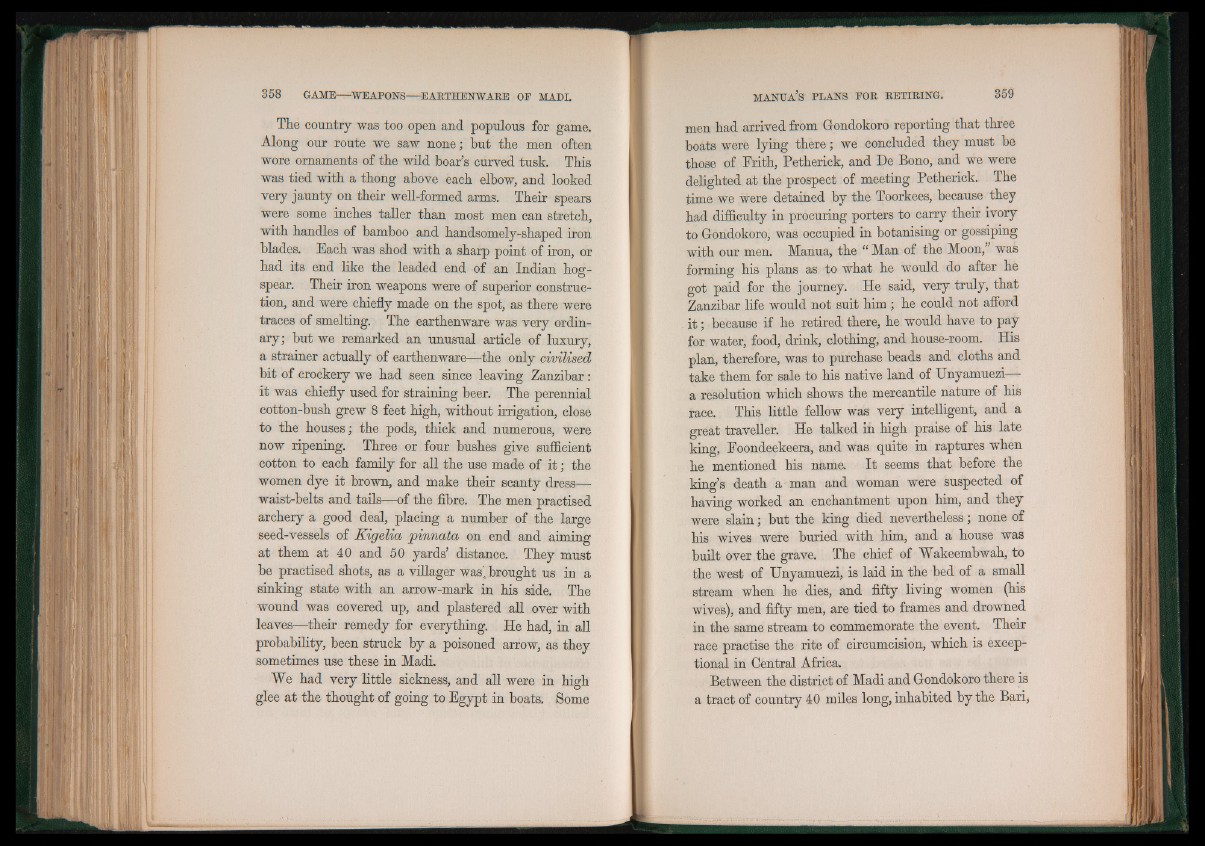
The country was too open and populous for game.
Along our route we saw none; but the men often
wore ornaments of the wild boar’s curved tusk. This
was tied with a thong above each elbow, and looked
very jaunty on their well-formed arms. Their spears
were some inches taller than most men can stretch,
with handles of bamboo and handsomely-shaped iron
blades. Each was shod with a sharp point of iron, or
had its end like the leaded end of an Indian hosf- O
spear. Their iron weapons were of superior construction,
and were chiefly made on the spot, as there were
traces of smelting. The earthenware was very ordinary;
hut we remarked an unusual article of luxury,
a strainer actually of earthenware—the only civilised
bit of crockery we had seen since leaving Zanzibar :
it was chiefly used for straining beer. The perennial
cotton-bush grew 8 feet high, without irrigation, close
to the houses; the pods, thick and numerous, were
now ripening. Three or four bushes give sufficient
cotton to each family for all the use made of i t ; the
women dye it brown, and make their scanty dress—
waist-belts and tails—of the fibre. The men practised
archery a good deal, placing a number of the large
seed-vessels of Kigelia pinnata on end and aiming
at them at 40 and 50 yards’ distance. They must
be practised shots, as a villager was!, brought us in a
sinking state with an arrow-mark in his side. The
wound was covered up, and plastered all over with
leaves—their remedy for everything. He had, in all
probability, been struck by a poisoned arrow, as they
sometimes use these in Madi.
We had very little sickness, and all were in high
glee at the thought of going to Egypt in boats. Some
men had arrived from G-ondokoro reporting that three
boats were lying there; we concluded they must be
those of Frith, Petherick, and De Bono, and we were
delighted at the prospect of meeting Petherick. The
time we were detained by the Toorkees, because they
had difficulty in procuring porters to carry their ivory
to Gondokoro, was occupied in botanising or gossiping
with our men. Manua, the “ Man of the Moon,’ was
forming his plans as to what he would do after he
got paid for the journey. He said, very truly, that
Zanzibar life would not suit him ; he could not afford
i t ; because if he retired there, he would have to pay
for water, food, drink, clothing, and house-room. His
plan, therefore, was to purchase beads and cloths and
take them for sale to his native land of Unyamuezi—
a resolution which shows the mercantile nature of his
race. This little fellow was very intelligent, and a
great traveller. He talked in high praise of his late
king, Foondeekeera, and was quite in raptures when
he mentioned his name. I t seems that before the
king’s death a man and woman were suspected of
having worked an enchantment upon him, and they
were slain ; but the king died nevertheless; none of
his wives were buried with him, and a house was
built over the grave. The chief of Wakeembwah, to
the west of Unyamuezi, is laid in the bed of a small
stream when he dies, and fifty living women (his
wives), and fifty men, are tied to frames and drowned
in the same stream to commemorate the event. Their
race practise the rite of circumcision, which is exceptional
in Central Africa.
Between the district of Madi and Gondokoro there is
a tract of country 40 miles long, inhabited by the Bari,